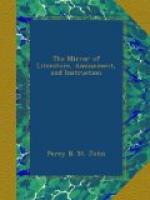Of the eloquence and general character of Lord Brougham, we have the following excellent portraiture by a master-hand:[6]—
“Mr. Brougham is from the North of England, but he was educated in Edinburgh, and represents that school of politics and political economy in the house. He differs from Sir James Mackintosh in this, that he deals less in abstract principles, and more in individual details. He makes less use of general topics, and more of immediate facts. Sir James is better acquainted with the balance of an argument in old authors; Mr. Brougham with the balance of power in Europe. If the first is better versed in the progress of history, no man excels the last in a knowledge of the course of exchange. He is apprized of the exact state of our exports and imports, and scarce a ship clears out its cargo at Liverpool or Hull, but he has notice of the bill of lading. Our colonial policy, prison discipline, the state of the hulks, agricultural distress, commerce and manufactures, the bullion question, the Catholic Question, the Bourbons or the Inquisition, ‘domestic treason, foreign levy,’ nothing can come amiss to him—he is at home in the crooked mazes of rotten boroughs, is not baffled by Scotch law, and can follow the meaning of one of Mr. Canning’s speeches. With so many resources, with such variety and solidity of information, Mr. Brougham is rather a powerful and alarming, than an effectual debater. In so many details (which he himself goes through with unwearied and unshrinking resolution) the spirit of the question is lost to others who have not the same voluntary power of attention or the same interest in hearing that he has in speaking; the original impulse that urged him forward is forgotten in so wide a field, in so interminable a career. If he can, others cannot carry all he knows in their heads at the same time; a rope of circumstantial evidence does not hold well together, nor drag the unwilling mind along with it (the willing mind hurries on before it, and grows impatient and absent)—he moves in an unmanageable procession of facts and proofs, instead of coming to the point at once—and his premises (so anxious is he to proceed on sure and ample grounds) overlay and block up his conclusion, so that you cannot




